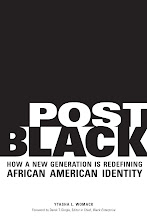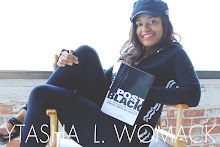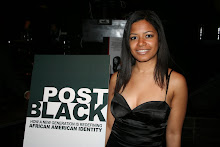Filmmaker, marketing professional, and educator, N'Namdi, a trilinguist, has lived, studied and worked in seven countries in South America, Europe, Asia and Africa. Along with her husband, Jacqueline, a Chicago and New York City resident, manages G.R. N'Namdi Gallery, the leading fine art gallery in the United States specializing in African American fine art. She and her husband Jumaane N'Namdi spent last summer filming their latest project “In Search of the Light: The Legacy of African American Artists Abroad. They launched the website to www. Artlegacyabroad.com, a catalog of African American artists. Here, she talks about traveling as an African American woman, and her latest project.
YLW: How has traveling abroad shaped your identity?
JN: Internationalism is a big part of who I am as an African American woman. Not touristic travel, but work and study. The more I see, the bigger it gets and I can understand myself, the country, and myself as an African American. It's priceless. I like meeting someone from China and saying, oh I used to live in Hong Kong, They immediately take me on as family. I would love for that to be reciprocated, for people to take interest in my culture. If someone told me they knew about Meta Vax Warrick Fuller, (African American artist) I would be excited.
YLW: What languages do you speak?
I speak French and Spanish. And I have studied Italian. Every country I go to I can say things in their language.
YLW: How has your experience abroad changed your concepts of African American identity?
JN: When I go abroad I'm able to see and experience how the rest of the world sees us. I have gained a tremendous respect for entertainment, music, film, all of those things that we produce. It's really important, because that's the only access they have to the African American experience. We have to depict ourselves in a full range.
YLW: Why do you say that?
JN: I've never been called the N word in the U.S. But I was called that overseas. I was in Macao which is an Island off the coast of Hong Kong. This guy says, I love your hair and he asked 'are you half a nigger?' I asked him where did you learn this word? And he said 'Die Hard 3: With a Vengeance.' I wasn't upset because I knew he didn't understand what he was saying and I told him that was a derogatory word. He was so embarrassed.
YLW: Have you had many experiences like that?
JN: I was in Venezuela with my girlfriends at the beach. We're in our swimsuits looking very cute. These guys are yelling 'niggers.' We got scared. Then we realized it was a truck full of young guys, waving out the truck flirting. They were happy to see us. And we said this is crazy, they don't even know what they're saying.
This summer, my husband and I were shooting the documentary. We had traveled to five different countries. We were checking into this hotel and this nice little lady asked Jumaane about his name. She asked where are you from, he said Detroit. America. She said no what country? He responded, America. But she was confused. Then she said, oh I see, you're from slave. Ytasha, I wasn't ready for that.
YLW: Wow.
JN: When I say America, they're thinking I don't look like whatever they think is the American girl next door. They want you to say a country. If you say you're African American they want you to say a country in Africa. So when she said, oh you're from slave. She wasn't trying to offend us. But that was her understanding, African Americans are descendants of slaves. It was awkward. We're enjoying ourselves, and she's like oh, you're from slave. That was a part of our experience, but there's more to us.
YLW: Are you constantly explaining your African American identity abroad?
JN: It's interesting, my white friends don't get haggled about where they're really from. They don't have to explain that their great great so and such was from Ireland. I've been places where people thought I was Algerian or Moroccan. I had an Algerian man who got mad at me when I said I was American, he didn't understand how that was possible.
Many people have never met an African American. They've met Africans, because there are a lot of Africans in Europe. A lot of them are afraid of us. They see things on TV or they reduce us to oh, you're from slave. It gives me more drive.
YLW: What experiences have you had with Africans and African Americans abroad?
That's interesting. When I was in Africa, I did a story on the perception of the African on the African Americans and vice versa. I was at the University Chiekh Anta Diop in Dakar, we met with the English club. I was very interested to see how they perceived us. One thing that astounded me was their knowledge of us. They had all seen Roots. Many of them had read books like Native Son, books by James Baldwin. They listened to rap. We went to the Goree Island where they exported many slaves. The African guide said 'This was the Door of No Return. But this is not true anymore,' he said,' because you are here and you have come.' I thought it was interesting how proactive they were about learning about us. On the other hand, African Americans knew very little about Africa. We didn't know how many countries there were.
YLW: How do you feel about the way African Americans perceive themselves?
I think we don't know enough about ourselves. My prime example is the fine arts. Even those who are highly educated. They could have went to the finest universities in the country, ask them about the African American fine artists, and they don't know about them. I feel as African Americans we're still learning about ourselves. Just like the people overseas are listening to the music and watching movies to define our identity. Well, the kids are doing that, too. That's why its important that people in the industry are mindful of that.
YLW: Why did you decide to produce “In Search of Light?”
JN: It's very fascinating. I think it's important to building the self esteem of African Americans, but its important as Americans that they know this. There's a lot of discourse on African American performing artist, or literary artists. If I ask most people to name an African American performing artists from a previous generation, they can do that. If ask about a visual artist, they can't name one. If they can name one, then I say, ok name two. All these artists were with Josephine Baker, James Baldwin, and others at the same table overseas, but when they came back no one knew them. Visual artists were under more pressure.
YLW: How so?
JN: Baker was entertaining people. But for the visual artists, it just wasn't seen as being as important. Even during the Civil Rights Movement, people were questioning their commitment or their blackness or their dedication to the cause because they were visual artists. They were ahead of their times. Oftentimes they were overseas alone. They were forging their own path. In some cases they were starving. They had a scholarship to go over there, but didn't have the funds to return. But they supported themselves with their art.
YLW: Do you just focus on artists who went to France?
JN: We explore African American artists who traveled overseas. Many went to Europe, but others went to Africa, Central America, Asia and South America. I asked artists why they kept coming back to Europe. And a lot of them talk about the quality of the light. They're talking about the sunlight quality, but for me, I feel they're talking about the knowledge, the experience the exposure.
YLW: Why did so many African American artists study or work abroad?
JN: For one, they had opportunity. They didn't have opportunity here. It was difficult to be an artists and be African American. There was this perception that there were so many other things that were important for us to be doing, so people felt like why are you studying art? There was so much exclusion. If they stayed in the U.S. They wouldn't have been able to develop their work.
YLW: Which artist among those who studied abroad intrigued you the most?
As I've done this research, I found so many artists, I even had to categorize them. Pre WWI, which includes enslavement, then post WWI, post WWII, then modern which is after 1970. I divided it based on wars, but what a lot of people didn't realize was that a lot of artists were veterans. That was the first way they were able to go overseas. Coming back as a veteran sometimes they were able to receive funding like the GI bill which allowed them to study overseas. Others wanted to go overseas but couldn't.
YLW: Which PreWWI artist impressed you?
JN: For one, you had African American artists who were exhibiting in Europe during the period of enslavement. Jules Leon, he was of biracial heritage, and he went overseas, he was born in France and he was exhibiting in the salons. He won the Paris Exhibition of 1833 for his lithographs. His father was a wealthy immigrant of Dutch/French descent. Their were a lot of people from New Orleans of rich heritage, their wealthy fathers would finance their trips. In fact, their were abolitionists groups who were offering scholarships during slavery.
YLW: Did any other artists resonate with you?
JN: Meta Vax Warrick Fuller. She graduated with honors from the Pennsylvania Museum School of Industrial Art, she won first prize for sculpture in the late 1800s. She got her teachers certificate and went to Paris. She went to the American Girls Club, where acclaimed American artists hung out, but was denied access because of her race. She was later a protege of Auguste Rodin. (Henry O.) Tanner was one of her mentors, he told her “Don't worry about this.” He became a Godfather to a lot of these artists. A lot of African Americans would go to Paris and seek him out.
YLW: What can artists today learn from those struggles?
Just being able to have entry into the fine art schools is something our generation should definitely not take for granted. Sometimes, its still difficult to find galleries. But that's why its important to do what we do. After school they have to be able to exhibit.
YLW: One of the reasons I wrote Post Black, was because there seems to be this definition of black life, and anything that didn't fit in that box is seen as an exception, not a part of the collective experience.
JN: Our gallery presents abstract art. It's non representational. We were at Art Chicago. A very well know art critic, was in our booth and he was looking for his friend. I asked, 'Did your friend come down.' He says 'Well, I don't think he would be in here because he doesn't like black art.' I wanted to kick him out the booth. I was just like, wow. There's no color in this work. Nothing on this wall has anything to do with color, well it has to do with color tones, but not race. How do you look at Ed Clark's work and say 'I don't like black art?' He doesn't paint people. He doesn't even paint landscapes.
I also have a problem with this term primitive when we talk about African art. I would get into arguments with everyone when I worked at the Guggenheim Museum in Italy because I had a problem with them calling it primitive just because they were self trained and didn't go to art school. I'm a linguist. I'm trilingual now. I respect the power of words. Even the psychology of words. When I hear primitive, I get offended, because the root word is primate. It's offensive. That word only refers to work that comes from Africa. In Russia, you don't call art buy untrained artists primitive, you call it folk art. I will always speak against that word.
YLW: Are people jealous of your international lifestyle?
JN: If I do perceive it that way, I change my thinking. And tell them how I did it. This wasn't a situation that was handed to me, I spent a lot of time researching and applying for things. If they feel that way, I shift it to them. My flight to Paris this summer cost $50, because I use points. Last year I want to Paris for free, to Brazil for free, because I'm anal about earning points. It becomes an opportunity. My best friend, I met in Venezuela overseas.
It's just a lifestyle actually. It's not about wealth, I was a student and I was traveling everywhere. I made money, I had access. I was willing to work. I've always been a hard worker. I would babysitting for this couple in France and they gave me an apartment on, the 16th, which is like the Beverly Hills in Paris. I was working, when all my friends went to the bar. I was babysitting and rushing these kids back and forth from school. In exchange, she gave me a little apartment, next to hers. In Venezuela, I lived with a family that didn't know English. My friend's a school teacher and every year she finds a study abroad program.
YLW: You don't want to be limited?
JC: Who's defining you? One day I'm in Italy looking at the Sistine Chapel . A man did this while painting on his back. Then I see the statue of David, and it's like Michaelangelo did both of those? Or Barbara Chase Riboud, she wrote about Sally Hemmings. She's written all these books. You don't even have to talk about her as a sculptor. Then you look at the fact that she's a major American artist with works all over the world. We interviewed her in Paris and Rome. She does all these different things. That's one thing I hope we get as African Americans. We're innovators. Hip hop came out of taking funding from music departments. They input these technology courses, then you have these deejays popping up. I hope we see that in ourselves.
I was reading this article about this kid in who made windmills in Malawi, Africa. He couldn't afford school, went to the library, studied windmills and starting making one out of scraps that changed his community. His name is William Kamkwamba and he wrote The Boy Who Harnessed the Wind. The elders said he was part of the cheetah generation. The cheetah generation was driven. They want to excel they want to be self made if they have, too. I think those of us who grew up in the 80s are like that. We can't get too comfortable. Yes we have access, yes there's an African American president, but we still have to be that cheetah who's still hungry, because their are still those who don't have those opportunities. We're the first generation who really has that power to tell our own stories. Our parents earned that power. It's so important that we tell these stories because people don't just know.
For more information on Jacqueline “In Search of Light” go to www.artlegacyabroad.com







